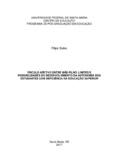| dc.creator | Sales, Filipe | |
| dc.date.accessioned | 2018-08-31T21:41:22Z | |
| dc.date.available | 2018-08-31T21:41:22Z | |
| dc.date.issued | 2017-07-11 | |
| dc.identifier.uri | http://repositorio.ufsm.br/handle/1/14154 | |
| dc.description.abstract | In the family context, the discovery of the deficiency of a child can cause a traumatic experience, altering the family dynamics and consecutively affecting all its members. From the diagnosis, the whole family seeks to reorganize, in order to adapt and regain their balance, because everyone will be affected. Due to this fact, parents, and especially the mother, understand that by having generated this child, has the duty to watch over him, preventing any "evil" from happening, often giving rise to a mother-child dependency, which may jeopardize their development. The present research focused on the development of the autonomy of students with disabilities who are in Higher Education. The objective was to know the process of building and establishing an affective bond between mother and child with disabilities, and its influence for the development of autonomy in the context of Higher Education. The method of qualitative approach was applied to the six participants of the research, that is, 3 mothers and 3 students (children) and used the following instruments of data collection: Two interview scripts on the development of student autonomy, made by the researcher and separately applied to mothers and students (children). The analysis of qualitative data was performed through Content Analysis. It was found that there is a relationship of dependence, but that the relationships established between mother and child with disabilities, did not affect the development of students' autonomy in Higher Education. It was concluded that the principle of the development of autonomy, Is associated to different intervening factors in the process of human development, but did not have a significant impact on people with disabilities. | eng |
| dc.description.sponsorship | Coordenação de Aperfeiçoamento de Pessoal de Nível Superior - CAPES | por |
| dc.language | por | por |
| dc.publisher | Universidade Federal de Santa Maria | por |
| dc.rights | Attribution-NonCommercial-NoDerivatives 4.0 International | * |
| dc.rights.uri | http://creativecommons.org/licenses/by-nc-nd/4.0/ | * |
| dc.subject | Autonomia | por |
| dc.subject | Educação superior | por |
| dc.subject | Deficiência | por |
| dc.subject | Família | por |
| dc.subject | Maternidade | por |
| dc.subject | Autonomy | eng |
| dc.subject | College education | eng |
| dc.subject | Deficiency | eng |
| dc.subject | Family | eng |
| dc.subject | Maternity | eng |
| dc.title | Vínculo afetivo entre mãe-filho: limites e possibilidades do desenvolvimento da autonomia dos estudantes com deficiência na Educaçâo Superior | por |
| dc.title.alternative | Afetive link between mother-son: limits and possibilities of development of autonomy of disabled students in Higher Education | eng |
| dc.type | Dissertação | por |
| dc.description.resumo | No contexto familiar, a descoberta da deficiência de um filho, pode ocasionar uma vivência traumática, alterando a dinâmica familiar e consecutivamente afetando todos os seus integrantes. A partir do diagnóstico, a família inteira, busca se reorganizar, no intuito de adaptar-se e reconquistar o seu equilíbrio, pois, todos serão afetados. Devido a este fato, os pais, e principalmente a mãe, compreende que por ter gerado este filho, tem o dever de zelar por ele, impedindo que nada de “mal” aconteça, originando muitas vezes uma dependência mãe-filho, que pode vir a comprometer seu desenvolvimento. A presente pesquisa versou sobre o desenvolvimento da autonomia dos estudantes com deficiência que estão na Educação Superior. Teve como objetivo conhecer o processo de construção e estabelecimento de vínculo afetivo entre mãe e filho com deficiência, e sua influência para o desenvolvimento de autonomia no contexto da Educação Superior. O método de abordagem qualitativa foi aplicado aos 6 participantes da pesquisa, isto é, 3 mães e 3 estudantes(filhos) e utilizou os seguintes instrumentos de coleta de dados: dois roteiros de entrevista sobre o desenvolvimento da autonomia do estudante, confeccionados pelo pesquisador e aplicados separadamente as mães e aos estudantes (filhos). A análise dos dados qualitativos foi realizada por meio da Análise de conteúdo. Constatou-se que existe uma relação de dependência, mas que as relações vinculares estabelecidas entre mãe e filho com deficiência, não afetaram o desenvolvimento da autonomia dos estudantes na Educação Superior. Concluiu-se que o princípio do desenvolvimento da autonomia, está associado a diferentes fatores intervenientes ao processo do desenvolvimento humano, mas não afetou de modo determinante as pessoas com deficiência. | por |
| dc.contributor.advisor1 | Pavão, Sílvia Maria de Oliveira | |
| dc.contributor.advisor1Lattes | http://lattes.cnpq.br/6934897603622261 | por |
| dc.contributor.referee1 | Costenaro, Regina Gema Santini | |
| dc.contributor.referee1Lattes | http://lattes.cnpq.br/0922777034087385 | por |
| dc.contributor.referee2 | Schmidt, Carlo | |
| dc.contributor.referee2Lattes | http://lattes.cnpq.br/7185372980306847 | por |
| dc.creator.Lattes | http://lattes.cnpq.br/3876341704244090 | por |
| dc.publisher.country | Brasil | por |
| dc.publisher.department | Educação | por |
| dc.publisher.initials | UFSM | por |
| dc.publisher.program | Programa de Pós-Graduação em Educação | por |
| dc.subject.cnpq | CNPQ::CIENCIAS HUMANAS::EDUCACAO | por |
| dc.publisher.unidade | Centro de Educação | por |



